Summary: Vitamin D deficiency during pregnancy may explain why males are three times more likely to be diagnosed with ASD than girls. The study reports prenatal vitamin d deficiency increases testosterone in the developing male brain.
Source: University of Queensland
A deficiency in Vitamin D on the mother’s side could explain why Autism spectrum disorder is three times more common in boys, say researchers from The University of Queensland.
In their latest study, Professor Darryl Eyles and Dr Asad Ali from UQ’s Queensland Brain Institute found vitamin D deficiency during pregnancy caused an increase in testosterone in the developing brain of male rats.
“The biological cause of Autism spectrum disorder (ASD) is unknown but we have shown that one of the many risk factors–low vitamin D in mothers–causes an increase in testosterone in the brain of the male foetuses, as well as the maternal blood and amniotic fluid,” Professor Eyles said.
“In addition to its role in calcium absorption, vitamin D is crucial to many developmental processes.
“Our research also showed that in vitamin D-deficient male foetuses, an enzyme which breaks down testosterone was silenced and could be contributing to the presence of high testosterone levels.”

Professor Eyles’ previous research has shown that vitamin D plays a critical role in brain development and that giving vitamin D supplements to mice during pregnancy completely prevented ASD-like traits in their offspring.
Co-author Dr Ali said that excessive exposure of the developing brain to sex hormones like testosterone was thought to be an underlying cause of ASD, but the reasons remained unclear.
“Vitamin D is involved in pathways controlling many sex hormones,” Dr Ali said.
“When the rat mothers were fed a low vitamin D diet, it caused male foetal brains to have high levels of exposure to testosterone.”
Professor Eyles said the study was the first to show that a known risk factor for ASD alters testosterone in both the foetal brain and the mother’s blood — one possible contributor to why ASD is more prevalent in males.
“We have only studied one risk factor for ASD — vitamin D deficiency during development — our next step is to look at other possible risk factors, such as maternal stress and hypoxia – lack of oxygen – and see if they have the same effect,” he said.
Funding: It is a collaboration with The University of Western Australia’s Dr Andrew Whitehouse and funded by the National Health and Medical Research Council Australia and Queensland Centre for Mental Health Research.
About this ASD research news
Source: University of Queensland
Contact: Jane Ilsley – University of Queensland
Image: The image is in the public domain
Original Research: Open access.
“Developmental vitamin D deficiency increases foetal exposure to testosterone” by Asad Amanat Ali, Xiaoying Cui, Renata Aparecida Nedel Pertile, Xiang Li, Gregory Medley, Suzanne Adele Alexander, Andrew J. O. Whitehouse, John Joseph McGrath & Darryl Walter Eyles. Molecular Autism
Abstract
Developmental vitamin D deficiency increases foetal exposure to testosterone
Background
Autism spectrum disorder (ASD) is a group of neurodevelopmental disorders which are more common in males. The ‘prenatal sex steroid’ hypothesis links excessive sex-steroid exposure during foetal life with the behavioural differences observed in ASD. However, the reason why sex steroid exposure may be excessive remains unclear. Epidemiological studies have identified several environmental risk factors associated with ASD, including developmental vitamin D (DVD) deficiency. We have demonstrated in an animal model that DVD-deficiency is associated with a hyper-inflammatory response in placentas from male but not female foetuses. Vitamin D also regulates the expression of several steroidogenic enzymes in vitro. Therefore using this animal model, we have examined whether DVD-deficiency leads to increased sex-steroid levels in both the maternal and foetal compartments.
Methods
Female rats are fed a vitamin D deficient diet from 6 weeks before mating until tissue collection at embryonic day 18. We examined the levels of testosterone, androstenedione and corticosterone in maternal plasma, foetal brains and amniotic fluid. We further examined gene expressions of steroidogenic enzymes and DNA methylation of aromatase promoters in foetal brains as a potential molecular mechanism regulating testosterone expression.
Results
We show that DVD-deficiency increases testosterone levels in maternal blood. We also show elevated levels of testosterone and androstenedione in the amniotic fluid of female but not male DVD-deficient foetuses. Testosterone levels were also elevated in DVD-deficient male brains. Vitamin D, like other steroid-related hormones, regulates gene expression via methylation. Therefore we examined whether the significant elevation in testosterone in male brains was due to such a potential gene-silencing mechanism. We show that the promoter of aromatase was hyper-methylated compared to male controls.
Limitations
A reduction in aromatase, in addition to causing excessive testosterone, could also lead to a reduction in estradiol which was not examined here.
Conclusions
This study is the first to show how an epidemiologically established environmental risk factor for ASD may selectively elevate testosterone in male embryonic brains. These findings provide further mechanistic support for the prenatal sex steroid theory of ASD.







